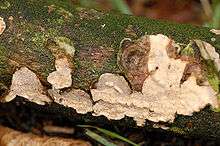Phanerochaete
| Phanerochaete | |
|---|---|
 | |
| Phanerochaete velutina | |
| Scientific classification | |
| Kingdom: | Fungi |
| Division: | Basidiomycota |
| Class: | Agaricomycetes |
| Order: | Polyporales |
| Family: | Phanerochaetaceae |
| Genus: | Phanerochaete P.Karst (1889) |
| Type species | |
| Phanerochaete alnea (Fr.) P.Karst. (1889) | |
| Synonyms[1] | |
|
Corticium Fr. (1835) | |
Phanerochaete is a genus of fungi in the family Phanerochaetaceae of the order Polyporales. Several of the species in this genus are plant pathogens. The genus was circumscribed by Finnish mycologist Petter Karsten in 1889.[2]
This genus includes "white-rot" fungi that are able to degrade lignin to carbon dioxide. This is achieved, in part, by lignin peroxidases and manganese peroxidases. These peroxidases are also able to mediate oxidation of a wide variety of organic pollutants. Recently, the genome of Phanerochaete chrysosporium has been sequenced and shows the genetic potential to make over 100 cytochrome P450 monooxygenases. White rot fungi have been used in bioremediation efforts to break down potentially harmful chemicals in soil and in water.[3] Phenol-formaldehyde is degraded by the white rot fungus Phanerochaete chrysosporium [4]
Species
- Phanerochaete aculeata
- Phanerochaete affinis
- Phanerochaete albida
- Phanerochaete allantospora
- Phanerochaete alnea
- Phanerochaete andreae
- Phanerochaete arenata
- Phanerochaete areolata
- Phanerochaete arizonica
- Phanerochaete aurata
- Phanerochaete australis
- Phanerochaete avellanea
- Phanerochaete binucleospordida
- Phanerochaete brunnea
- Phanerochaete bubalina
- Phanerochaete burtii
- Phanerochaete cacaina
- Phanerochaete calotricha
- Phanerochaete cana
- Phanerochaete carnosa
- Phanerochaete caucasica
- Phanerochaete chrysorhizon
- Phanerochaete chrysosporium
- Phanerochaete commixtoides
- Phanerochaete cordylines
- Phanerochaete crescentispora
- Phanerochaete deflectens
- Phanerochaete emplastra
- Phanerochaete exilis
- Phanerochaete galactites
- Phanerochaete globosa
- Phanerochaete hiulca
- Phanerochaete incrustans
- Phanerochaete intertexta
- Phanerochaete jose-ferreirae
- Phanerochaete laevis
- Phanerochaete leptoderma
- Phanerochaete luteoaurantiaca
- Phanerochaete martelliana
- Phanerochaete mauiensis
- Phanerochaete omnivora
- Phanerochaete parmastoi
- Phanerochaete percitrina
- Phanerochaete pseudomagnoliae
- Phanerochaete radicata
- Phanerochaete robusta
- Phanerochaete sacchari
- Phanerochaete salmoneolutea
- Phanerochaete salmonicolor
- Phanerochaete sanguinea
- Phanerochaete sordida
- Phanerochaete subceracea
- Phanerochaete subglobosa
- Phanerochaete taiwaniana
- Phanerochaete tamariciphila
- Phanerochaete tuberculascens
- Phanerochaete tuberculata
- Phanerochaete velutina
- Phanerochaete viticola
- Phanerochaete xerophila
References
- ↑ "Phanerochaete P. Karst. 1889". MycoBank. International Mycological Association. Retrieved 2012-05-02.
- ↑ Karsten P. (1889). "Kritisk öfversigt af Finlands Basidsvampar (Basidiomycetes; Gastero- & Hymenomycetes)". Bidrag till Kännedom of Finlands Natur Folk (in Finnish) 48: 1–470 (see p. 426).
- ↑ Syed K, Yadav JS. (May 25, 2012). "P450 monooxygenases (P450ome) of the model white rot fungus Phanerochaete chrysosporium". Critical Reviews in Microbiology 38 (4): 339–63. doi:10.3109/1040841X.2012.682050. PMID 22624627.
- ↑ Gusse AC; Miller PD; Volk TJ (July 2006). "White-rot fungi demonstrate first biodegradation of phenolic resin". Environmental Science and Technology.